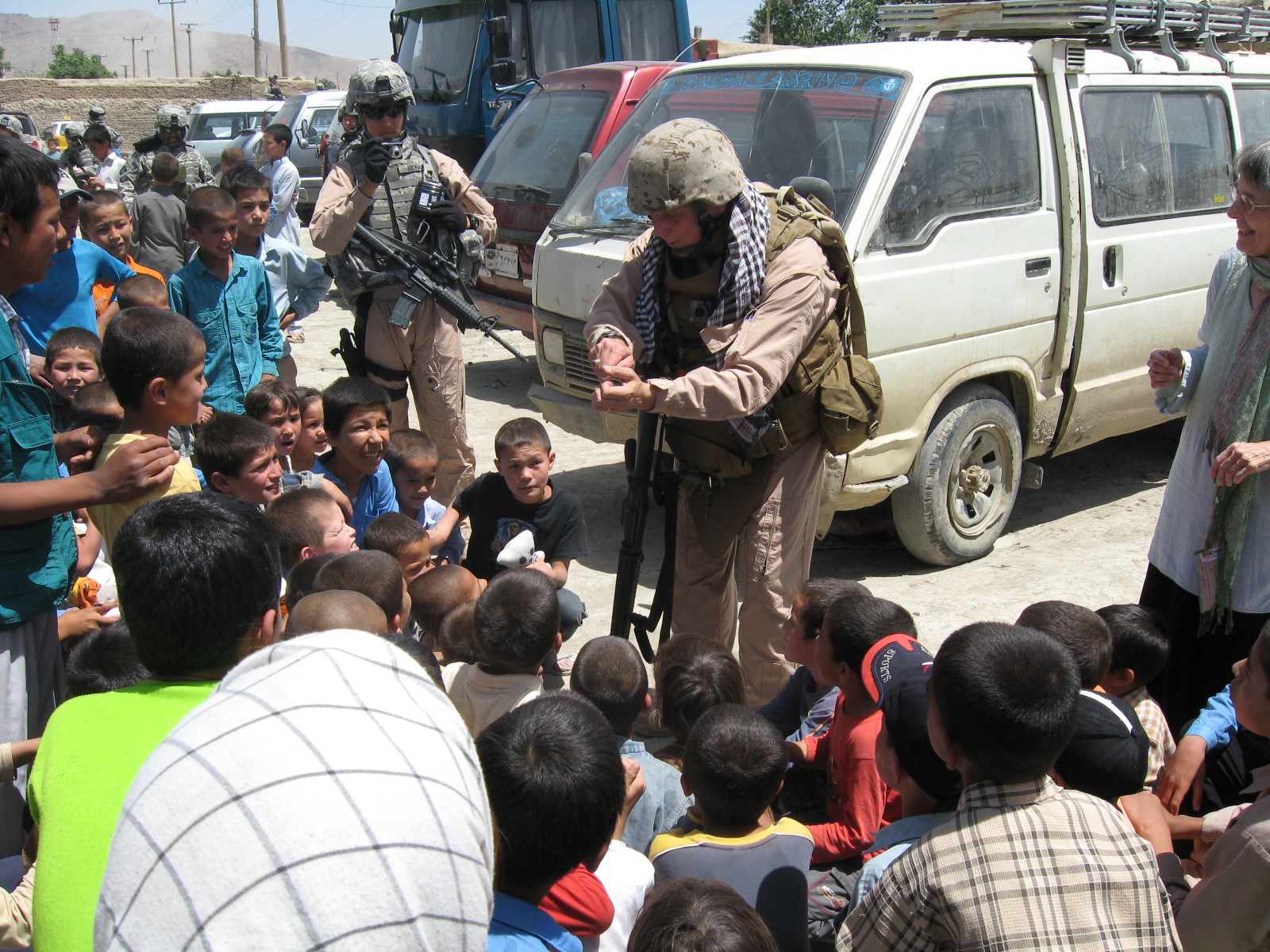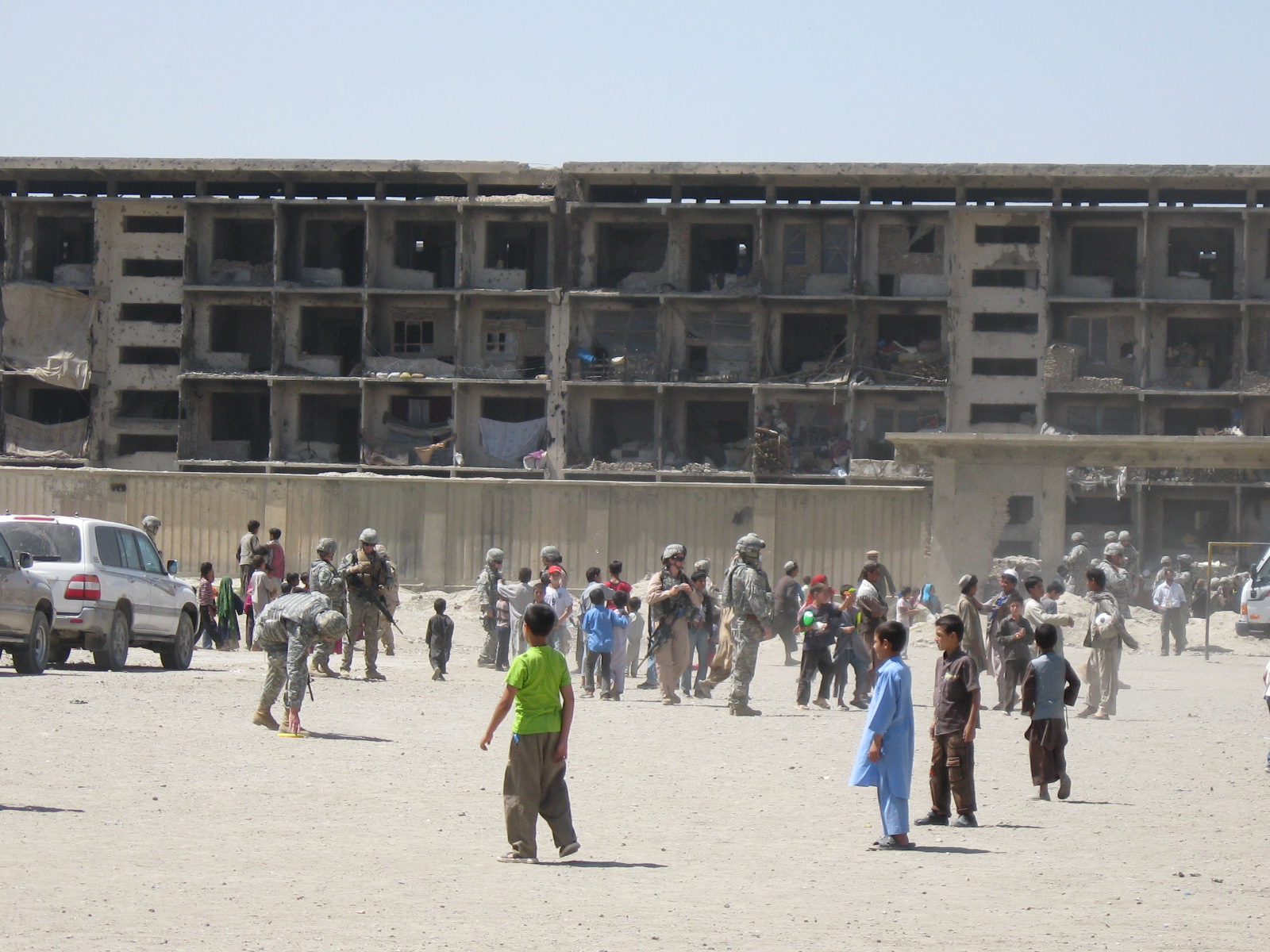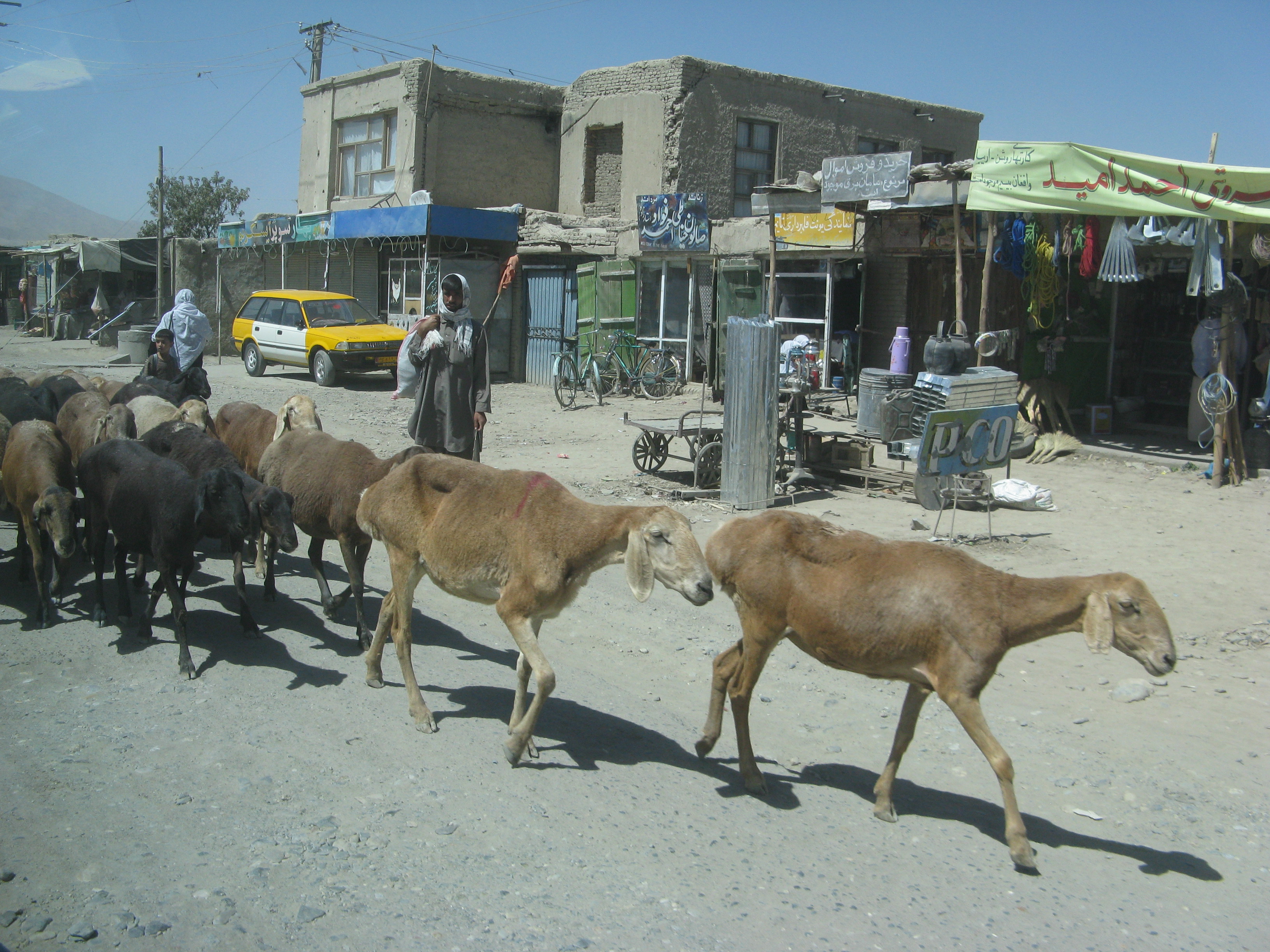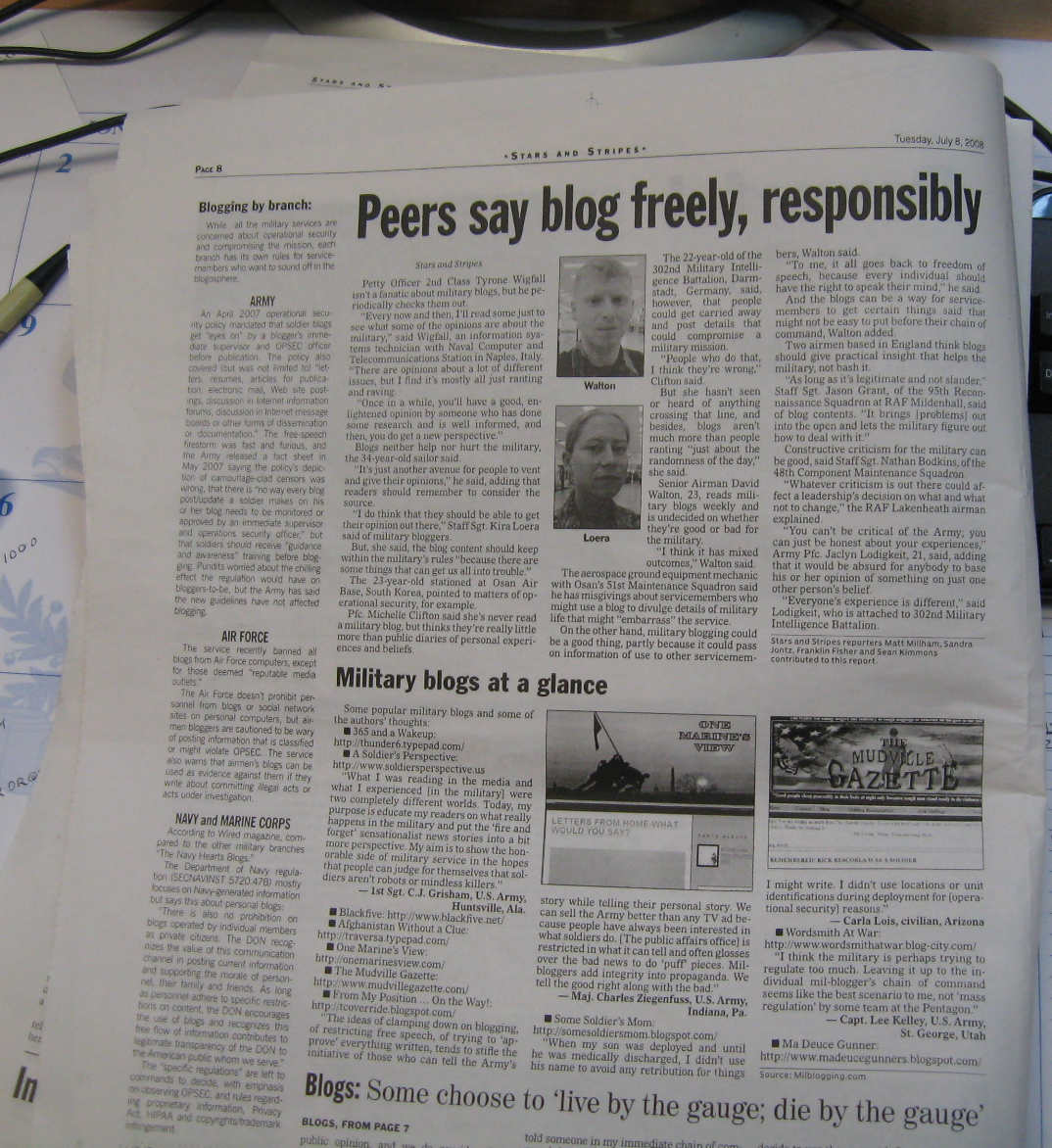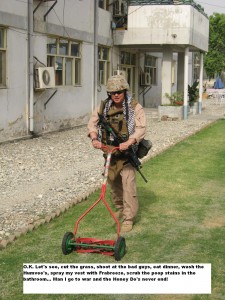August 6th, 2008 Posted in The SandGram v1.0 | 8 Comments »
Hey Guys,
This little piece is interesting, especially since the press has told the world that the US Government had this woman, Aafia Siddiqui, in a jail cell on the base up at Bagram for four years. If you Google “The Grey lady of Bagram prisoner 650” you’ll find pages upon pages of stories of how for the last four years, we, the Military have held this woman under guard, molested her and beat her, yada, yada, yada. Now here is a case where for years, she has been running around doing who knows what, training who knows where and the press was just flat out wrong.
She was caught planning a bombing mission and captured by the Afghan National Police (doing a great job by the way) and while in her jail cell, attacked two FBI agents along with the Army soldiers sent to transfer her to another prison. This resulted in her catching a non critical gunshot wound to the abdomen when she tried putting her little paws on an M-4 one of the Army guys had and a little R and R in one of our hospitals. (Yes, they actually treated her and gave her medicine) She is just lucky the Marines weren’t there or she would have “lead poisoning” about right now, (just kidding Army) I can write about this since the press has picked up on it and I saw the piece running on BBC world news last night. There are lots of unanswered questions about this gal and I think this is a story worth following if you know what I mean in terms of who she was married to, what ties she has with Pakistan and Al Qaeda and what the hell she has been doing these last four years.
You will probably see this turned into a movie by some network if all the facts come out. Then again, some Hollywood liberal might make a fiction movie telling how she escaped from the prison after being raped all those years by the guards and was on the way to my FOB to free Osama bin Laden, who is currently shackled in my basement. (This has to be true; I read it in an email sent to me from my brother’s cousins, sister’s boyfriend who heard it from the Local National brought in to do his culturally sensitive meals.) Anyway, you can’t make this stuff up…
Semper Fi,
Taco
Here are the different pieces on the story and they go from straight fiction to some tidbits of info.
Pakistani Scientist Accused Of Aiding Al Qaeda
NY Times
ERIC SCHMITT
05 August 2008
WASHINGTON – An American-trained Pakistani neuroscientist was arrested last month in Afghanistan and has been charged with aiding Al Qaeda, American military and law enforcement officials said Monday.
The scientist, Aafia Siddiqui, who studied at Brandeis University and the Massachusetts Institute of Technology, was being transferred to New York where she will face criminal charges stemming from her ties to senior Al Qaeda operatives now imprisoned at Guantanamo Bay, Cuba, the officials said.
Ms. Siddiqui, 36, mysteriously disappeared with her three children while visiting her parents’ home in Karachi, Pakistan, in March 2003, about the same time the Federal Bureau of Investigation announced that it wanted to question her.
Human rights group and a lawyer for Ms. Siddiqui, Elaine Whitfield Sharp, say they believe that Ms. Siddiqui has been secretly detained since 2003, for much of that time at Bagram Air Base in Afghanistan.
“We believe Aafia has been in custody ever since she disappeared,” Ms.
Sharp said in a telephone interview Monday, “and we’re not willing to believe that the discovery of Aafia in Afghanistan is coincidence.”
But American military and intelligence officials said that Ms. Siddiqui was in Pakistan for most of the past five years until she and her 12-year-old son were arrested in Ghazni, Afghanistan, on July 17. The American officials accused Ms Siddiqui trying to bomb the residence of Ghazni’s provincial governor.
“She was not in U.S. custody,” said a senior American intelligence official, who spoke on condition of anonymity because of the pending legal action against her.
The intelligence official said that Ms. Siddiqui was injured when an American soldier shot her while taking custody of her from Afghan police last month. Afghan officials initially said the shooting happened during an argument between the Americans and Afghans, but they later said Ms.
Siddiqui lunged at one of the American soldiers, and he fired his rifle.
A Justice Department spokesman in Washington and an F.B.I. spokesman in New York declined to comment. Ms. Siddiqui’s detention was reported on Sunday in the The Boston Globe.
Ms. Sharp said that an F.B.I. agent notified Ms. Siddiqui’s brother last week that she was alive Siddiqui, but she said that the American government has given her no information about Ms. Siddiqui’s whereabouts. “It’s Kafka-esque,” she said.
A former senior Justice Department official said that Ms. Siddiqui’s family in the United States was almost certainly wiretapped under the National Security Agency’s warrantless wiretapping program.
Scientist Tied To Al Qaeda Is Ordered Held Without Bail
Wednesday, August 6, 2008
New York Times
By Benjamin Weiser And Eric Schmitt
A Pakistani neuroscientist who American officials say was a facilitator for Al Qaeda was ordered held without bail on Tuesday by a federal court in Manhattan, on charges that she had tried to kill American soldiers and F.B.I. agents in Afghanistan.
The scientist, Aafia Siddiqui, was taken into custody last month after she was found loitering outside an Afghan police station with suspicious items in her handbag, including documents describing the creation of explosives, a criminal complaint says.
A day later, prosecutors have charged, she picked up an unsecured M-4 rifle and fired at least two shots toward one of the soldiers who was part of an American team of F.B.I. agents and military personnel who were about to question her. No one was hit, and another soldier returned fire with a 9-millimeter pistol, hitting her at least once in the torso.
Ms. Siddiqui, 36, whose head was covered with a maroon scarf in court, sat quietly as a magistrate judge rejected her lawyer’s request that he dismiss the charges immediately.
The lawyer, Elizabeth M. Fink, told the judge that the allegation that her client, who the lawyer said weighed 90 pounds, had picked up the rifle and attacked the Americans, was “patently absurd.”
“Is that what happened, Judge?” Ms. Fink asked.
But Judge Ronald L. Ellis of United States District Court said he saw “no reason to doubt the information” in the complaint, and set a hearing for next Monday to address the government’s request that Ms. Siddiqui be detained without bond pending trial.
Ms. Siddiqui, who studied at the Massachusetts Institute of Technology and Brandeis University, was transferred to New York from Afghanistan on Monday.
United States intelligence agencies have said that she had links to at least 2 of the 14 men suspected of being high-level members of Al Qaeda who were moved to Guantánamo Bay, Cuba, in September 2006.
The charges against her, however, do not appear to be related to those allegations, but to what prosecutors say was her assault on the Americans who were about to question her.
Ms. Fink said after the hearing that her client was innocent and would fight the charges.
The hearing cleared up none of the mysteries that have surrounded Ms. Siddiqui’s case since she disappeared with her three children while visiting her parents’ home in Karachi, Pakistan, in March 2003.
Her family and human rights groups have said they believe that she was being held secretly; a family lawyer, Elaine Whitfield Sharp, said after the hearing that it was “in U.S. detention.”
The American authorities deny that assertion and say they have no knowledge of where she was for the past five years, until she was taken into custody last month. Sam Zarifi, the Asia-Pacific director for Amnesty International, on Tuesday challenged the American government’s version of the events that led to Ms. Siddiqui’s detention.
Mr. Zarifi said that Ismail Jahangir, a spokesman for the Ghazni provincial governor, told him by telephone on Tuesday that he had no information about the shooting and that Ms. Siddiqui was in “fine condition” when she was turned over to American officials.
Attempts to reach Mr. Jahangir on Tuesday to corroborate that account were unsuccessful.
In court, Ms. Siddiqui responded to some of the judge’s questions but seemed uncertain at times.
“She is a little fragile at the moment,” Ms. Fink told the judge, adding that her client was still recovering from her gunshot wound, and that she had been without antibiotics or painkillers.
A federal prosecutor, Christopher L. Lavigne, responded that when Ms. Siddiqui left Afghanistan, a physician was on the plane with her until she landed in the United States, and that she had received medical care.
Other unanswered questions include what has happened to Ms. Siddiqui’s children, and where she says she has been for the past five years.
Ms. Siddiqui’s lawyers said they met with her before the hearing but lacked privacy and were unable to explore details of her case with her.
Doubt Cast On U.S. Version Of Terror Suspect’s Arrest
Wednesday, August 6, 2008
McClatchy
By Saeed Shah
ISLAMABAD, Pakistan – As U.S. authorities took a purported al Qaida operative to court on attempted murder and assault charges Tuesday in New York, her family, the Afghan police and the Human Rights Commission of Pakistan cast doubts on the accuracy of the American story.
On Monday, the Department of Justice announced that Aafia Siddiqui, a Pakistani woman who was educated in the United States, had been taken into custody in mid-July in Afghanistan.
She was arraigned in court in New York Tuesday, and her case has inflamed anti-American sentiment in Pakistan and triggered street protests against Siddiqui’s detention.
According to the criminal complaint filed in the Southern District of New York, Siddiqui was arrested on July 17 by Afghan security forces in Ghazni province in eastern Afghanistan with her 12-year-old son. She was found with documentation on explosives, descriptions of U.S. landmarks and various chemical substances, the complaint says, and a day later, she was handed over to U.S. intelligence and military officials.
The complaint says that she got hold of an officer’s M-4 rifle in an interrogation room and fired two shots, which missed. The officer used his pistol to fire back and hit her at least once in the torso, according to the charges.
Afghan police, however, said that U.S. soldiers demanded that local police hand over Siddiqui, but they refused, according to a report from Ghazni by [a major news wire]. When the Americans disarmed the Afghan police at gunpoint, Siddiqui approached the Americans, complaining of mistreatment by the police, according to this account.
The U.S. troops, according to an unnamed Afghan police officer, “thinking that she had explosives and would attack them as a suicide bomber, shot her and took her,” [a major news wire]reported.
Siddiqui’s family, meanwhile, alleges that she’d been in secret custody since she disappeared five years ago from the Pakistani city of Karachi with her three children, and the Human Rights Commission of Pakistan, an independent organization, called the U.S. account a “cock and bull story.”
A Justice Department spokesman, Dean Boyd, said in Washington that the allegations weren’t true. “We stand by the facts as alleged in the criminal complaint filed in court,” he said. “In addition, suggestions that Siddiqui has been in U.S. custody for five years are not accurate. She was detained on July 17, 2008, as alleged in the criminal complaint.”
Legal experts in the United States said the case against Siddiqui might reflect a new willingness by the Bush administration to prosecute some terror suspects in federal court rather than before military commissions at the U.S. detention camp at Guantanamo Bay, Cuba.
However, they said that while the administration has suffered a series of legal setbacks in its prosecution of the war on terror, notably from the U.S. Supreme Court, they saw no evidence of a major shift in detention policy.
Siddiqui’s family and activists think that she was in the hands of Pakistani intelligence and then handed over to the United States. Several former detainees at Bagram Air Base in Afghanistan have said they heard the screams of a woman, who’s been dubbed “The Gray Lady of Bagram.” Fauzia Siddiqui, Aafia Siddiqui’s sister, and Yvonne Ridley, a British journalist turned human rights campaigner, said they think the cries came from Aafia Siddiqui, who they contend was physically and sexually abused at the air base.
“This is the real crime of terror here,” said Fauzia Siddiqui.
I.A. Rehman, the director of the Human Rights Commission of Pakistan, said the American version of the arrest didn’t hold up.
“Obviously she was arrested in 2003, but we don’t know at what stage she was handed over to the Americans,” said Rehman.
The Pentagon has denied that any women are held at Bagram.
It’s unclear what’s happened to her son or her other two children.
Siddiqui has been on the FBI and CIA wanted list for years. According to the old allegations made against Siddiqui, she rented a post office box on behalf of al Qaida suspect Majid Khan, worked as a fixer in the Boston area for alleged 9/11 mastermind Khalid Sheikh Mohammed, and raised funds for al Qaida through a diamond transaction in Liberia.
A Pentagon jury of six U.S. military officers is now deliberating the war crimes case of Salim Hamdan, Osama bin Laden’s driver, in the first contested U.S. war crimes trial since World War II. Conviction could bring life imprisonment.
“It is a little ironic that while the government is trying to prove the military commissions process is legitimate in the Hamdan trial that the next person they arrest immediately goes into the federal court system,” said David Glazier, a professor who studies the law of war at Loyola Law School Los Angeles. “That sends an interesting mixed signal.”
Even as the administration has struggled to defend its detention policies, prosecutors are better funded and have been granted more powers since the September 11 terrorist attacks to go after terrorism suspects in criminal courts, said Matthew Waxman, the deputy assistant Secretary of Defense for detainee affairs from August 2004 to December 2005.
“Using an enemy combatant approach has become harder,” he said. “In some ways, using a criminal approach has become easier.”
Elaine Whitfield Sharp, a U.S. attorney representing Siddiqui, didn’t return calls.
US/Pakistan: Mystery Of ‘Ghost Of Bagram’
The Guardian (UK)
Suzanne Goldenberg and Saeed Shah
6 August 2008
For five years no one would say for certain whether Aafia Siddiqui, a mother of three with a PhD from an elite American university, was alive or dead. Her family did not know and authorities in Pakistan and the US were not saying.
Yesterday, as Siddiqui was produced before a magistrate in New York to face charges of attacking US army officers in Afghanistan last month, that central mystery was resolved.
The devout Pakistani-American Muslim, once named by the US authorities as a key al-Qaida operative, is indeed alive and now in US custody.
But almost nothing can be said for certain about her whereabouts since March 2003 when she was last seen climbing into a taxi with her three children in Pakistan’s biggest city, Karachi.
Some campaigners believe Siddiqui was snatched by Pakistani intelligence agencies, passed to the Americans and held in solitary confinement at the US base in Bagram, Afghanistan. There she acquired mythical status – prisoner 650 – whose wails haunted other inmates.
But the US, which has made multiple allegations against Siddiqui over the years, depicting her as a courier of blood diamonds and a financial fixer for al-Qaida, has denied holding her, raising the question where has she been for five years?
Even Siddiqui’s eventual emergence three weeks ago in Afghanistan is riddled with confusion. The official complaint against Siddiqui says she was picked up outside the governor’s compound in the eastern Afghan city of Ghazni on July 17 by police who became suspicious of her inability to speak either of Afghanistan’s main languages, Pashtu or Darri.
They searched her handbag, discovering documents detailing how to make dirty bombs and biological weapons, descriptions of New York City landmarks, as well as sealed glass jars of “numerous chemical substances”.
A day later, the complaint says, two US army officers and two FBI agents arrived in Ghazni with their interpreters for a meeting – not realising that Siddiqui was standing behind a yellow curtain in the same room.
Siddiqui is then alleged to have jumped out from behind the curtain and snatched up the assault rifle one of the officers had placed on the floor by his feet, pointing it at the Americans, and screaming threats in English. She is said to have fired at least two shots by the time an interpreter managed to wrestle the gun away from her.
According to the complaint, one officer heard her yell: “Allahu Akbar” as she opened fire. One interpreter claimed she shouted: “Get the fuck out of here.”
She was shot and hit at least once in the torso but, according to the complaint, continued to hit and kick the officers before losing consciousness.
Siddiqui’s lawyer, Elaine Whitfield Sharp, told CNN the scenario was utterly implausible. “This is a very intelligent woman. What is she doing outside of the governor’s residence?” Sharp said.
“The woman is a PhD. Is a woman like this really that stupid? There is an incongruity, and I have trouble accepting the government’s claims.”
Yesterday Afghan police in Ghazni offered another competing version of her detention, telling Reuters that the US troops had demanded she be handed over. When Afghan police refused, they were disarmed. The Americans shot at Siddiqui, thinking she was a suicide bomber. A teenage boy who was with Siddiqui remained in Afghan police custody.
Before yesterday’s court appearance in New York Siddiqui was last seen heading for Karachi’s railway station where, along with her three children, then seven, five and six months old, she planned to catch a train to visit an uncle in Islamabad.
Her life before that was exemplary by any accounts. She had studied in America, earning a degree from MIT before moving on to a PhD in cognitive neuroscience from Brandeis University. She was married – unhappily – to a Pakistani.
Acquaintances over her years in Boston have described her commitment to Islam. She returned to Pakistan in 2002, where her marriage broke up and she was living with her family at the time of her disappearance. Siddiqui’s relatives believe that she was abducted by Pakistani intelligence agents and later transferred to US custody.
US and Pakistani officials initially admitted that she was indeed in detention, and some reports said she was being held by the Americans outside Kabul.
But by 2004 John Ashcroft, then US attorney general, said she was among seven high-level al-Qaida suspects still at large.
In the meantime, concern for her grew after accounts emerged from prisoners at Bagram of a solitary woman inmate. Anger at her disappearance was further stoked last month when Yvonne Ridley, a British Muslim journalist, flew to Pakistan and held a press conference claiming that Siddiqui was Prisoner 650 at Bagram.
Imran Khan, the cricketer turned politician, hosted the event, where Ridley, who also now does human rights work, said: “I call her the ‘grey lady’ because she is almost a ghost, a spectre whose cries and screams continue to haunt those who heard her.” A group of Arab prisoners who escaped from Bagram in 2005 said they saw a woman being taken to the toilets at the base.
After breaking out, Abu Yahya al-Libi told an Arabic news channel that there was a woman from Pakistan at Bagram who was referred to simply as prisoner 650, held in solitary confinement.
She went to the bathroom “led by the American (soldier), placing his hand on one of her shoulders and the other hand on her back, and her hands and feet chained together,” he said.
“This woman stayed there until she lost her mind, until she became insane, hitting the door and screaming day and night.”
The American account of her capture was dismissed yesterday. “This is one of the greatest lies of the 21st century . . .” said IA Rehman, director general of the Human Rights Commission of Pakistan (HRCP), an independent organisation. “The public clamour has now forced them to own up.”
Siddiqui’s sister, Fauzia, said she had been raped and tortured.
“Her rape and torture is a crime beyond anything she was accused of,” said Fauzia Siddiqui. “This is the real crime of terror here.”
She pleaded for the child who was with her sister when she was captured, according to the American authorities, to be immediately handed over to the family. It is unclear what has happened to the other two children.
“She has had no access to any lawyer . . .presume her to be innocent before proven guilty, please. How can this punishment be fit for any crime?” said Fauzia Siddiqui.
The HRCP has demanded an inquiry into where Siddiqui was kept and under what conditions.
Asim Qureshi, a London-based investigator for Cage Prisoners, a campaigning group, said the US had in the past denied holding other prisoners, such as Mustafa Setmariam Nasar, a Spaniard of Syrian descent also captured in Pakistan.
“They just release the information when it suits them . . . everything we know about Bagram means that we know she (Siddiqui) would have suffered abuse,” said Qureshi.
Fauzia Siddiqui claims her sister was raped and tortured at Bagram and held without access to a lawyer.

